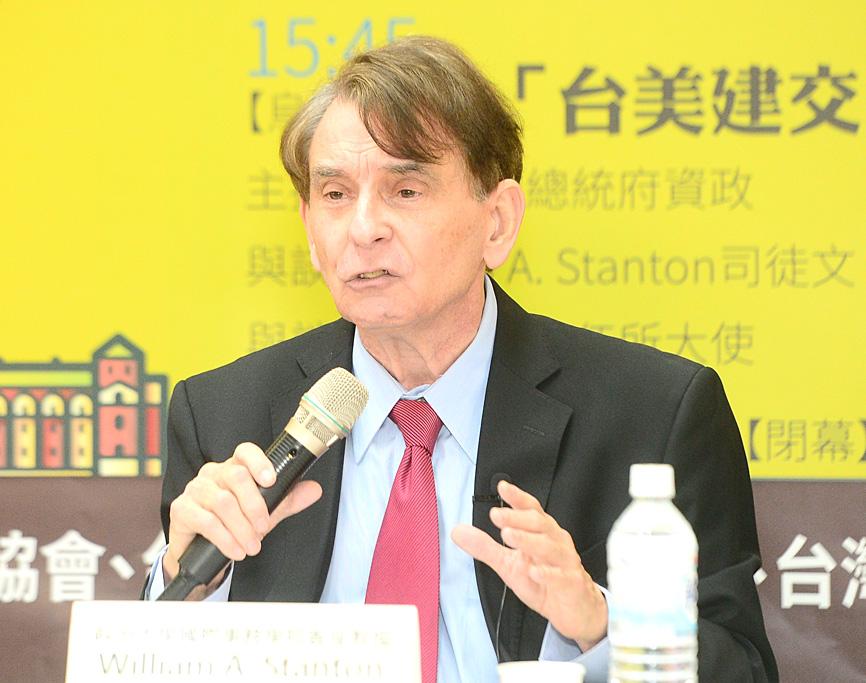Practical measures of support for Taiwan by the US government are more important than diplomatic recognition of the country, former director of the American Institute in Taiwan (AIT) William Stanton said on Saturday at a forum in Taipei.
Stanton said that he does not foresee any major changes in the US’ engagement with Taiwan, which is why he was surprised when former US secretary of state Mike Pompeo in Taiwan earlier this month called for the US to recognize Taiwan as a “free and sovereign country.”
“Setting aside whether secretary of state Pompeo had ever proposed this to [former US president Donald] Trump, a more important question, from my perspective, is whether he had discussed this first with the Taiwanese government, either before or during his visit,” Stanton said.

Photo: Wang Yi-sung, Taipei Times
Stanton, a chair professor at National Chengchi University and a lecturer at its International College of Innovation, said he believes that any shift in the US’ position on cross-strait relations must be coordinated with the Taiwanese government.
“It is easy for a US politician to take a forward-leaning stand on Taiwan, but Taiwan will always bear the brunt of any People’s Republic of China reaction to policy shifts,” said Stanton, who served as AIT director from 2009 to 2012.
Pompeo was “one of the few top officials in the Trump administration who really cared about Taiwan,” Stanton said.
However, there is no reason for a shift in the US’ diplomatic policy on Taiwan, he added.
“The Taiwanese government needs to consider not only the practical potential gains of diplomatic recognition but also the possible costs,” he said.
The US should avoid rhetoric and take practical steps to strengthen its relationship with Taiwan and boost its defense capabilities, he said.
US President Joe Biden and his administration “have repeatedly said the US’ support for Taiwan is ‘rock-solid,’ but no one knows what that specifically means,” Stanton said. “Even the metaphor is troubling. Not all rock is solid. Shale is usually soft and brittle, and limestone is soft as well.”
He said that Washington should consider supportive measures such as signing a bilateral free-trade agreement, lifting the existing range restrictions on Taiwan’s missiles and expanding exchanges so that more young Americans can visit Taiwan.
Taiwan’s Ministry of Foreign Affairs declined to comment on Pompeo’s call for the US to recognize Taiwanese sovereignty, saying that the former US official is now a private citizen and it respected his right to comment.
The AIT was established in 1979 to represent US interests in Taiwan when diplomatic ties between the countries were cut.

Taiwan has received more than US$70 million in royalties as of the end of last year from developing the F-16V jet as countries worldwide purchase or upgrade to this popular model, government and military officials said on Saturday. Taiwan funded the development of the F-16V jet and ended up the sole investor as other countries withdrew from the program. Now the F-16V is increasingly popular and countries must pay Taiwan a percentage in royalties when they purchase new F-16V aircraft or upgrade older F-16 models. The next five years are expected to be the peak for these royalties, with Taiwan potentially earning

STAY IN YOUR LANE: As the US and Israel attack Iran, the ministry has warned China not to overstep by including Taiwanese citizens in its evacuation orders The Ministry of Foreign Affairs (MOFA) yesterday rebuked a statement by China’s embassy in Israel that it would evacuate Taiwanese holders of Chinese travel documents from Israel amid the latter’s escalating conflict with Iran. Tensions have risen across the Middle East in the wake of US and Israeli airstrikes on Iran beginning Saturday. China subsequently issued an evacuation notice for its citizens. In a news release, the Chinese embassy in Israel said holders of “Taiwan compatriot permits (台胞證)” issued to Taiwanese nationals by Chinese authorities for travel to China — could register for evacuation to Egypt. In Taipei, the ministry yesterday said Taiwan

Taiwan is awaiting official notification from the US regarding the status of the Agreement on Reciprocal Trade (ART) after the US Supreme Court ruled US President Donald Trump's global tariffs unconstitutional. Speaking to reporters before a legislative hearing today, Premier Cho Jung-tai (卓榮泰) said that Taiwan's negotiation team remains focused on ensuring that the bilateral trade deal remains intact despite the legal challenge to Trump's tariff policy. "The US has pledged to notify its trade partners once the subsequent administrative and legal processes are finalized, and that certainly includes Taiwan," Cho said when asked about opposition parties’ doubts that the ART was

If China chose to invade Taiwan tomorrow, it would only have to sever three undersea fiber-optic cable clusters to cause a data blackout, Jason Hsu (許毓仁), a senior fellow at the Hudson Institute and former Chinese Nationalist Party (KMT) legislator, told a US security panel yesterday. In a Taiwan contingency, cable disruption would be one of the earliest preinvasion actions and the signal that escalation had begun, he said, adding that Taiwan’s current cable repair capabilities are insufficient. The US-China Economic and Security Review Commission (USCC) yesterday held a hearing on US-China Competition Under the Sea, with Hsu speaking on